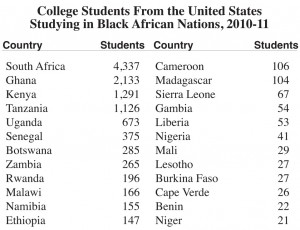 According to data from the Institute of International Education, nearly 274,000 American students studied at foreign institutions of higher education during the 2010-11 academic year. This was up 1.3 percent from a year earlier. A vast majority of Americans studying abroad (54.6 percent) attended universities in Europe. Of all U.S. students studying abroad, 14,087, or 5.1 percent, attended universities in Africa. The number of American students studying in Africa dropped by 4.4 percent from the previous year. But the percentage of all students who study abroad who go to African universities has increased over the past decade. Africa sends more than two and a half times as many students to American universities as America sends to African universities.
According to data from the Institute of International Education, nearly 274,000 American students studied at foreign institutions of higher education during the 2010-11 academic year. This was up 1.3 percent from a year earlier. A vast majority of Americans studying abroad (54.6 percent) attended universities in Europe. Of all U.S. students studying abroad, 14,087, or 5.1 percent, attended universities in Africa. The number of American students studying in Africa dropped by 4.4 percent from the previous year. But the percentage of all students who study abroad who go to African universities has increased over the past decade. Africa sends more than two and a half times as many students to American universities as America sends to African universities.
Of the 14,087 Americans studying in Africa, 2,209, or 15.7 percent, were studying in the northern African nations of Egypt, Algeria, Morocco, and Tunisia.
 Among sub-Saharan African nations, South Africa was by far the most popular destination. In the 2010-11 academic year, 4,337 American students studied in South Africa. Ghana hosted 2,133 American students in the 2010-11 academic year. More than 1,000 American students studied abroad in Kenya and Tanzania. Uganda, Senegal, Botswana, and Zambia hosted more than 200 American students. Rwanda, Malawi, Namibia, Ethiopia, Cameroon, and Madagascar were the only other sub-Saharan African nations hosting more than 100 American college students.
Among sub-Saharan African nations, South Africa was by far the most popular destination. In the 2010-11 academic year, 4,337 American students studied in South Africa. Ghana hosted 2,133 American students in the 2010-11 academic year. More than 1,000 American students studied abroad in Kenya and Tanzania. Uganda, Senegal, Botswana, and Zambia hosted more than 200 American students. Rwanda, Malawi, Namibia, Ethiopia, Cameroon, and Madagascar were the only other sub-Saharan African nations hosting more than 100 American college students.
While the data does not reveal what percentage of American students studying abroad in Africa are African Americans, we do know that of the 273,996 American students studying abroad in all areas of the globe, about 13,150, or 4.8 percent, are African Americans.









